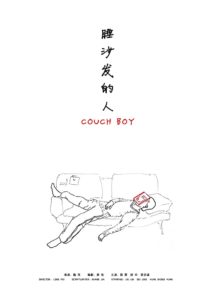Couch Boy
睡沙发的人
China, 2017, colour, 1.85:1, 77 mins.
Director: Long Fei 龙飞.
Rating: 7/10.
A precision piece of wry chamber cinema centred on a teen slacker and his grumpy grand-uncle.
Wuhan city, central China, the present day. Su Yike (Liu Lin) helps his friend Mi San’er (Dong Yunfei) break into the flat of the latter’s ex-girlfriend (He Xingjing) to retrieve his mother’s platinum necklace he once gave her. The robbery does not go well for the pair. Su Yike lives at home with his mother Wang Baoqin (Qiu Ling), who runs a small clothes shop. He’s almost 20 and has failed the university entrance exam; his mother wants him to go back to senior high school to re-sit the exam the following year but all places are already full. The chronically idle Su Yike is delighted but then his mother buys him some books to study at home. She is then forced to bring her eccentric uncle Zhang Renyu (Yuan Zhongyuan) to live with them after the latter is evicted by his landlord. He brings boxes and boxes of books with him and is given the room of Su Yike, who has to sleep on the sofa bed in the living room. He’s a man of few words (most of them critical) and spends the whole time reading his books, which are all famous works by literary greats. While Wang Baoqin is at work during the day, the two men hardly speak to each other at home. But then Zhang Renyu unexpectedly takes Su Yike’s side when Wang Baoqin criticises her son’s lack of interest in studying. The two men cautiously start to communicate, and Su Yike’s life is changed forever.
REVIEW
A born slacker finds a goal in life from the most unexpected quarter in Couch Boy 睡沙发的人, a wry, beautifully played piece of chamber cinema that marks a highly impressive debut by Mainland indie film-maker Long Fei 龙飞. Written, shot and edited with absolute precision, the conversation piece barely scrapes 75 minutes in length; and with its concise trajectory and structure the film feels more like a long short than a short feature. But that in no way diminishes its accomplishment. It will be interesting to see which way Long – and his writer and fellow producer Huang Jia 黄佳 – bounces next.
The only information available about Long (whose name, “Flying Dragon”, would seem to be a nom de plume) is that he graduated in film-making and digital media from Hong Kong’s Baptist University. Other peripheral clues are ambiguous: the film’s title and credits are all in traditional rather than simplified characters, Long and Huang’s presenting company is registered in Chongqing, central China, but the film itself is set in Wuhan, further down the Yangtze. Apart from one exterior shot of a Wuhan police station, however, the film could have been shot anywhere in the Mainland, as the majority of it is set in a single flat.
The film’s sly sense of humour and roundabout approach are evident from the opening scene, in which two youths break into a flat with a hare-brained scheme. The subsidiary character in that scene then turns out to be the main one of the film – a chronic slacker with the funny-sounding name Su Yike 粟一柯 (which a young neighbour keeps mispronouncing as Yike Shu 一棵树, “A Tree”). Goal-less in life, nagged by his mother (especially after failing the university exam), and relegated to a sofa-bed when his eccentric, book-reading grand-uncle comes to stay, Su Yike finds himself gradually bonding with the phlegmatic, pedantic old man who, paradoxically, seems to be the only one who understands him. The film’s basic theme of finding and releasing the hidden potential in people emerges from what initially seems like a situational black comedy but from the 45-minute mark onwards takes on a strangely inspiring tone.
As the slacker of the title, newcomer Liu Lin 刘霖 has just the right amount of wide-eyed, slightly goofy charm to bring the character off in a sympathetic way; but it’s seasoned character actor Yuan Zhongyuan 袁忠远, as the boy’s grumpy old grand-uncle, who makes all the film’s ingredients blend, often with the smallest look or physical gesture. The two performers establish an appealing complicity that drives the movie, supported by solid playing from Wuhan TV and theatre actress Qiu Ling 邱玲 as the teen’s naggy but finally supportive mother and several briefer roles of visiting relatives. Capping the whole thing is a beautifully written, funny-touching rooftop scene between the teen and his slacker pal (played by Dong Yunfei董云飞) that deftly draws a line under the film’s theme as the friend makes a surprising confession. It’s one of many small, illuminating moments – including a walk in the park by the boy and grand-uncle – with which the whole film is peppered.
Long’s sharp, clear digital photography is always finely composed, and editing is similarly on the nose. Musical selections underline the quirky tone. The film’s Chinese title literally means “The Person Sleeping on the Sofa”. One funny joke is not translated in the subtitles: the proverb on the wall, whose second character is wrongly written, initially reads 知齿而后勇 (“From teeth comes courage”); this is quietly corrected by the grand-uncle to the identically pronounced 知耻而后勇 (“From shame comes courage”).
CREDITS
Presented by Chongqing Yiye Pianzhou Culture Media (CN).
Script: Huang Jia. Photography: Long Fei. Editing: Long Fei. Music: various. Art direction: uncredited. Sound: Wei Jun.
Cast: Liu Lin (Su Yike), Qiu Ling (Wang Baoqin, his mother), Yuan Zhongyuan (Zhang Renyu, his grand-uncle), Dong Yunfei (Mi San’er, his friend), He Xingjing (Mi San’er’s ex-girlfriend), Wan Wenjun (Su Yike’s aunt), Yan Han (Su Yike’s uncle), Lei Yang (Liqian, Su Yike’s cousin), Zhu Ruixi (neighbour’s young son), Xu Guanjie (schoolboy), Tan Keying (schoolgirl), Qiu Chen (Xiaoqiu, grand-uncle’s landlord), Wang Wei (Hua), Liu Heng (Jianzong, Su Yike’s uncle from Japan).
Premiere: Shanghai Film Festival, 21 Jun 2017.
Release: China, tba.
